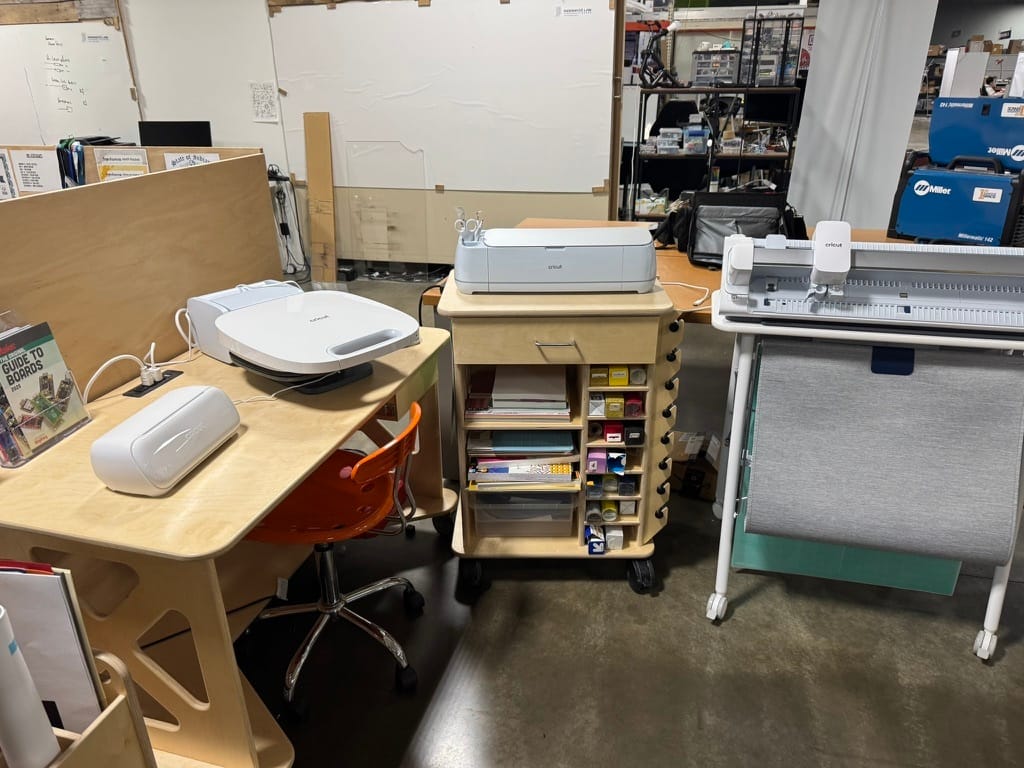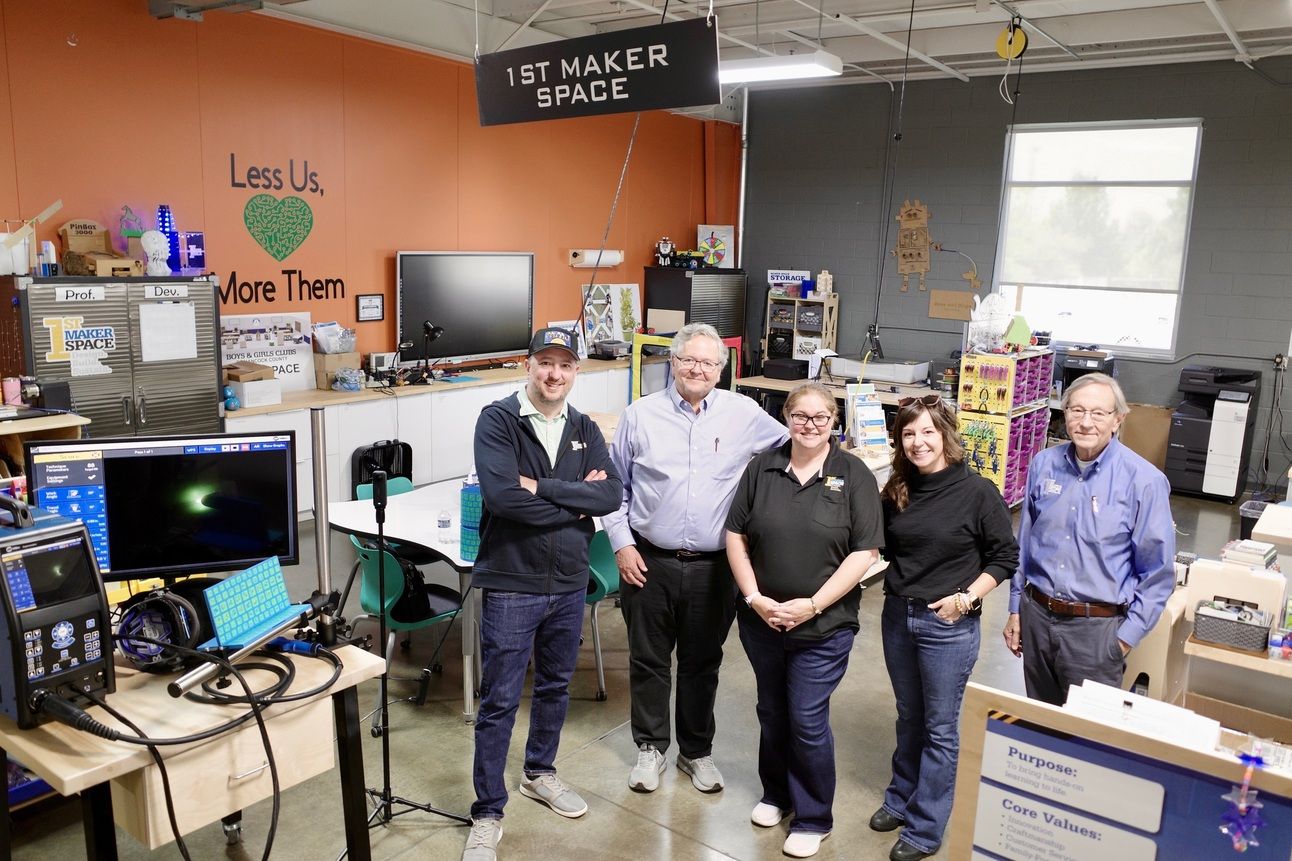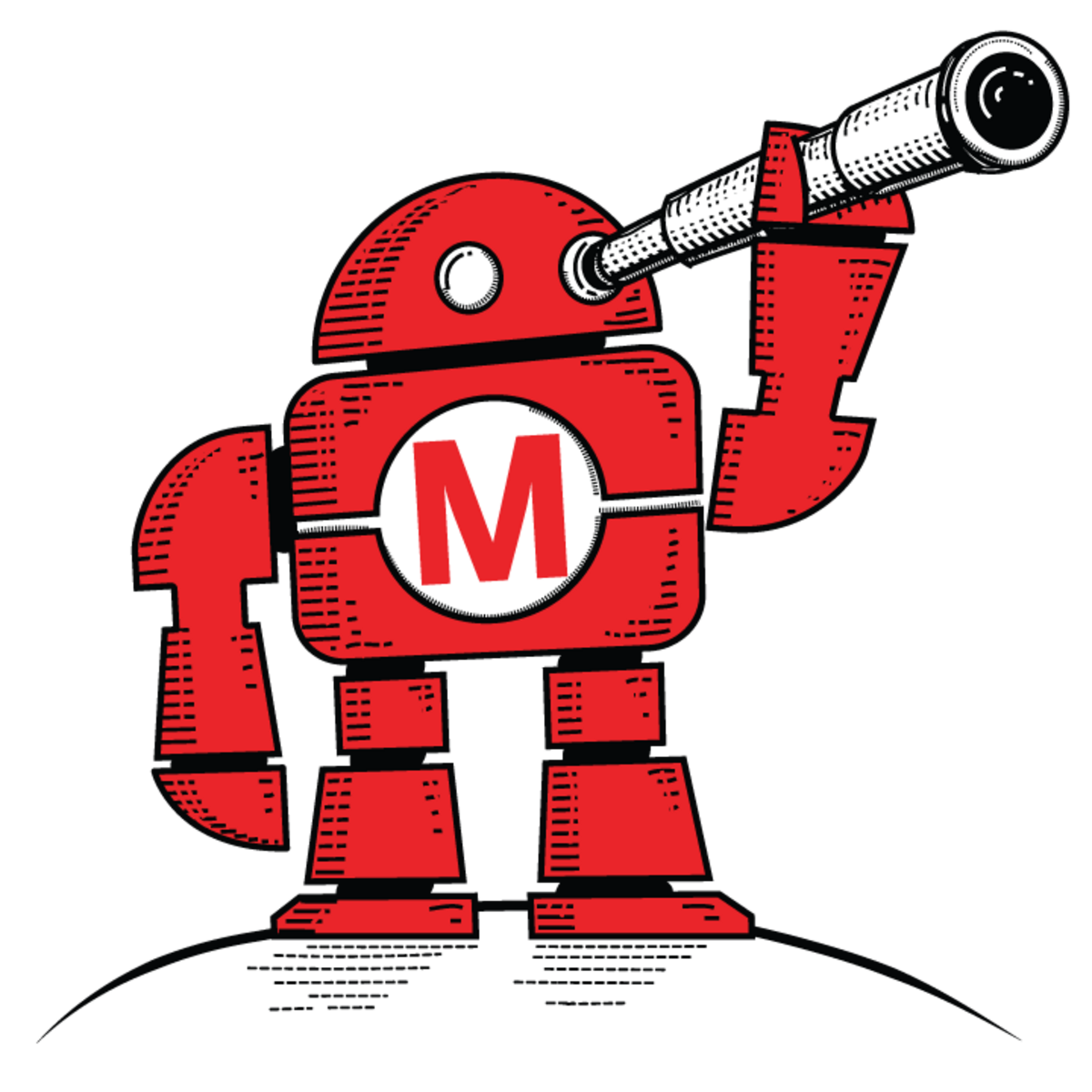Table of Contents

School furniture from 1st Maker Space to organize Cricut equipment and supplies
TariffsareBullshit.com
After seeing Adafruit’s $36,126 bill, Carrie Sundra of Alpenglow had the idea of creating a clearing house for all of the similar pangs of pain that our community had been expressing, including her own video, under the conveniently available domain tariffsarebullshit.com. Friend and collaborator Jason Coon of Evil Genius Labs jumped at the chance to leverage his web dev skills to help the community, and the result was a GitHub Pages-based site that anyone can contribute their stories and experiences to. I asked Carrie and Jason for a little more insight into the frustrations that they were experiencing, which led to this site:
For most people, how the things they use everyday are made is invisible. I wanted there to be a place where people could see how the “sausages” of everyday life are made, so they’d understand that manufacturing here and in any country uses a worldwide supply chain for parts. In the case of electronics, there simply is no US source for components. It is all Asia, and concentrated in China because China has actually put resources into building up their expertise and capabilities for decades. You can’t just turn off practically free trade and expect US manufacturers to stay in business, much less expect there to be products on shelves at price points that most Americans can afford. I wanted people to understand how many people are affected by these incredibly stupid policies, and how that’s going to affect their own lives in a few months. And I think it’s more powerful to hear the stories of the actual people and companies going through this, than some generic economic summary in a news article.
I have completely stopped ordering parts and custom printed circuit boards, since it's no longer possible to know their final cost. The additional tariff cost isn't even known when ordering, as it depends on the current rate (which keeps changing) when it goes through US customs. I'm continuing to sell my limited stock at the current price. After that, I'll wait until there is some semblance of trade policy stability. I am just one hobbyist selling extremely low quantities in my very limited spare time. I don't rely on the income to support myself or my family, so I can just stop. I have friends who do not have that privilege, and I fear for them. I really want to know how this is affecting other individuals, small businesses, and even employees of large enterprises.
The changes to the de minimus exemption (that allowed packages under $800 to come into the U.S. duty-free) are incredibly unfair to small businesses. Small orders are now (currently) taxed twice as much as large orders. The focus seems to have been on lower-priced goods from Shein and Temu, but US small businesses have relied on the de minimus exemption to help offset the cost of prototyping. The increased cost of making things in smaller quantities is now crushing small businesses.
How are the tariffs affecting you as a maker or small business? Submit a pull request and let us know!
— David Groom
Matt Eaton is the author of our new book, Robotic Arms. He’s also the makerspace manager at High Point University in North Carolina. He believes that Robotic Arms are a great place to start learning robotics at the college level. His article, Robot Arm Sketchbot, is in the current issue of Make Magazine.
We will discuss beginner-friendly approaches to Arduino-powered robotic arms, using simple, affordable parts. Plus, learn all about how to achieve complex movement by using servo motors and a mathematical concept called inverse kinematics, to enable your robots to move, lift, and draw with more precision than humans! This session is a great starting point for students, teachers, and total beginners to get into robotics.
So join this FREE online event on Thursday, May 22, 2025, at 4 pm PST, to learn about the exciting world of robotic arms!
REGISTER here to attend the live event on Zoom.

Indiana’s 1st Maker Space

From left, Adam Brand, (me), Megan Ewing, Amber Hudson, and Kim Brand
Last week, I had the opportunity to visit 1st Maker Space (1stMakerSpace.com) in Fishers, IN, which is outside Indianapolis. I enjoyed the day spent meeting with the vibrant team, headed by Kim Brand, and talking about maker education.
Their business is designing and outfitting makerspaces in schools and training teachers. They have an office, shown above, in a tech incubator and they also have a factory in an industrial building (below) where they use a CNC to make furniture. Ironically, they don’t have their own makerspace.
Adam Brand has designed good-looking furniture for the needs of school makerspaces such as rolling carts or tool organizers. Pictured at the top of the newsletter is a workstation for Cricut equipment and supplies that have become popular in school makerspaces. He also designed an impressive playfield for Vex Robotics that folds up and down against the wall — his early prototype was a modified Murphy bed.

Rolling carts and tool organizer
James Wehmeier, who runs the CNC machine, studied art in college ( I think he said that his Dad was a Make: subscriber and he grew up familiar with making.) Now he’s a maker and loves his job, using the CNC to cut plywood for the furniture. Below, James is using a air-suction device that Adam (clever fellow) made so that James can pick up a piece of plywood and move it to the bed of the CNC all by himself, freeing up Adam to do whatever else he was doing. (Aside: I’m reading stories based on polls that Americans don’t want to work in factories; this is a factory, and James was really happy to have this job; it’s nice work if you can find it.)

James Wehmeier demonstrating the air-suction device
Educators Amber Hudson, along with Megan Ewing, developed maker curriculum which is available for free on 1st Maker Space website. If you like to teach making based on standards (“the good thing about standards is that there’s so many of them to choose from.”), then they’ve done the work for you.
Amber and Marilyn Nash have self-published a book called “A Maker’s Life: Authentic Makerspaces - Knowing Your Why for Making”. I had a chance to talk to Marilyn and Amber about the book. Marilyn, a retired educators, is a lifelong maker (and she’s still going strong). She was also one of the first to enroll in the Makerspace Manager certification program at 1st Maker Space. Marilyn told me a story that’s in the book, explaining “how making saved her life” when she was a young child. Her teacher brought a personal weaving loom into class and she made a woven mat. “The woven mat had boundaries and predictability that other parts of my frightening young life did not have. Weaving was a life saver.”
I hope to have a follow-on conversation with Marilyn and Amber.

Amber and I posing with each other’s books
Kim Brand is the founder and president of 1st Maker Space. He is a mechanical engineer. He told me that he started the business originally to make industrial 3D printers around 2013 but transformed it into a company that helps schools set up makerspaces. We need more schools with fully functioning makerspaces and fully trained teachers who can guide and encourage kids to develop both the skills and mindset of a maker.
Make: Vol 93 Launch Party video
We had a great “live” conversation and show-and-tell about robots and block printing with contributors to Make: Vol 93. Our guests included Michael Brady, creator of Voxhead, our cover robot model; Nathan Kau of the Pupper robot, as well as Lee Wilkins who talked about block printing and moiré patterns. David Groom, Keith Hammond and myself were part of the conversation.

Screenshot from Make: V93 Launch Party
If you missed it live, here’s the video:
Best wishes to the producers of this weekend’s Maker Faire in the Ukraine.
Make Things is a weekly newsletter for the Maker community from Make:. This newsletter lives on the web at makethings.make.co
I’d love to hear from you if you have ideas, projects or news items about the maker community. Email me - [email protected].

